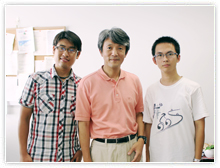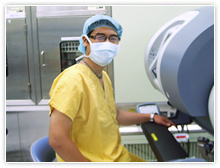Clinical Exchange in Japan
Welcome to Japan and Nagoya University school of Medicine!
Experience Stories in Nagoya Univ. School of Medicine
Dr. Wang from China
Comments and/or Opinions about Clinical Clerkship in Nagoya University Graduate School of Medicine
Mr. Wang Hui
 This summer, I had a good opportunity to study in the Nagoya University Hospital. During this program, I have studied in the ophthalmology department, gastroenterology department and cardiac surgery department. I have been trained for basic clinical skills and some basic daily work here and also a lot of Japanese culture. I was treated very well here. In addition, I have found some different aspects between China and Japan in medical system.
This summer, I had a good opportunity to study in the Nagoya University Hospital. During this program, I have studied in the ophthalmology department, gastroenterology department and cardiac surgery department. I have been trained for basic clinical skills and some basic daily work here and also a lot of Japanese culture. I was treated very well here. In addition, I have found some different aspects between China and Japan in medical system.
I will list some major difference below:
About the professor: In Japanese university hospitals, each department only has one professor, a typical structure includes one professor and no more than two vice professors unlike China. In China, we have a different title for high position doctors, the most powerful one called "department director", and we also have many other directors and vice directors such "ward director" and so on. Regardless of the work title as director we also have teaching titles like professor, but in China we have many professors in one department. The Japanese medical professor takes charge of all the work such as human resource, finance, research, teaching, clinical work and administration, acting as the definite leader of the department. While the president of the hospital is only responsible for the planning and development of the hospital instead of the routine works of each department. And the professors are hired by their capability and number of papers published, but in China our professors and directors are always keep lifelong.
In my opinion, I think the Japanese system is better than that in China because it is more competitive and more effective. As a consequence of one professor taking charge the whole department, the power and right is highly concentrated, so everything can be done more quickly and have less procedure.
 About the residents: in Japan, the normal medical education lasts six years. When graduated, students can get the bachelor degree. They start their internship in hospital when fifth grade, and prepare for the medical license examination in their sixth grade, and when graduated they can get their license. After that, they begin their resident life. In China, we have many different type of learning system; we have 5 years, 7 years and 8 years program. I am an 8 years program student. For 8 years program students, we must pay 2 years into some basic knowledge learning such as math, physics, history, biology, political science and something else. Then we begin one and half years in medical college study basic medical knowledge such as biochemistry, philology, pathology and so on. They we start our intern life in hospital, this period will last 2 and a half years. The last two years, we become a resident and when graduated, we will get doctor degree. We take the national medical license examination in seventh grade. In a word, we have more time in hospital for clinical training in China, and we pay fewer years to get the doctor degree.
About the residents: in Japan, the normal medical education lasts six years. When graduated, students can get the bachelor degree. They start their internship in hospital when fifth grade, and prepare for the medical license examination in their sixth grade, and when graduated they can get their license. After that, they begin their resident life. In China, we have many different type of learning system; we have 5 years, 7 years and 8 years program. I am an 8 years program student. For 8 years program students, we must pay 2 years into some basic knowledge learning such as math, physics, history, biology, political science and something else. Then we begin one and half years in medical college study basic medical knowledge such as biochemistry, philology, pathology and so on. They we start our intern life in hospital, this period will last 2 and a half years. The last two years, we become a resident and when graduated, we will get doctor degree. We take the national medical license examination in seventh grade. In a word, we have more time in hospital for clinical training in China, and we pay fewer years to get the doctor degree.
However, the competition in China is much fiercer, because we have too much students here. You know, in Japan, a medical student can choose his major freely and easily but not like in China. We must test and compete with our classmates. This kind of competition lasts till to go to work. We also can easily get a job in any hospital we want to. So it is very difficult for us to be a doctor in China. Besides of this, the research environment in Japan is much better than us, we donít have so many opportunities to go aboard either. As a result, our research is poor.
About the patient and hospital: the Japanese university hospitals assume the responsibility of teaching and research, therefore, these hospitals usually provide the best equipment and the best doctors. But the doctors there are not very busy and the daily amount of outpatient is not so large. This is related with the deployment of the medicine resource and the public awareness. Japan have more private clinic than China. The people in China usually donít believe the private clinic and usually want to go the big hospital especially the university hospital. We donít have enough GP in community or good medical insurance system for public. So the public must pay a lot (compared with their income) for medical treatment. Big hospital must treat a lot of patients no matter what their ill is. And the doctors here must work more than 80 hours per week. So the doctorís life here is very tough.
The time here in Nagoya University is very short, but I have experienced a very happy and meaningful life here. Thanks for all the stuff here and thanks for all the Japanese people, I hope one day I will come back again.
Click here to read other stories
Nagoya University Graduate School of Medicine